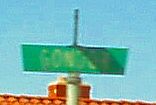A few years ago I lived in the city of Lake Forest (formerly El Toro) for a bit. One of the interesting things about Lake Forest is its collection of streets named after characters and places in Lord of the Rings. (And yes, these were around long before the movies were made.)
I still drive past Gondor Drive on my way back from the comic store, and I’ve been meaning to get a picture of the street sign for a while. It turned out to be too hard to shoot without actually aiming, so I turned onto a smaller street where I knew I could catch Elrond Lane:

Other Tolkien-inspired streets include: Buckland Lane, Bywater Road (and it is at least near water), Rivendell Drive, Shadowfax Drive and Brandywine Lane.
While checking the Thomas Guide for some of the ones I missed, I just discovered a neighborhood with Sesame Street, Muppet Lane, Big Bird, Oscar, Grover, and Cookie Monster. And Kurmit [sic], though I suppose that could be a typo.
And then there’s Dana Point, which has the Street of the Green Lantern. Of course, it has about 20 named Street of the fill-in-the-blank Lantern — Blue, Amber, Golden, Silver, Violet, etc. [Update: Here are some Green Lantern Street photos.]
Update Sep. 24: Here’s a blurry picture of the Gondor street sign:
